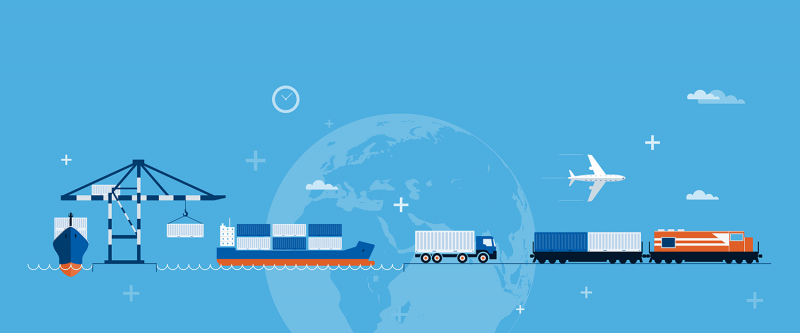Benefits of EDI in Logistics & its Impact on Supply Chain
Logistics make for an indispensable part of the entire supply chain. Transportation industry facilitates the movement of goods across continents for every sector, making it a driving force for the world economy.
But this industry processes perhaps the most substantial amount of information that is being shared between supply chain participants via mountains of paper every day. Fluid communication & optimum exchange of information between logistics partners & other participants in the supply chain is a necessity for ensuring high efficiency of operations.
Improving Flow of Information
Providing carriers with access to all the information at their fingertips can go a long way in guaranteeing quick and error-free transactions with minimal human intervention.
Automation of data exchange has enormous benefits not just for inhouse logistics and third party logistics services (3PLS) but for the entire supply chain consisting of manufacturers, suppliers, distributors & retailers.
This is why EDI has become very popular in the industry with increasing number of logistics providers integrating their business systems to facilitate EDI document exchange.
Logistics companies are employing various EDI solutions like invoice automation software to manage their operational processes in a hassle-free way.
What is EDI
Electronic Data Interchange (EDI) is the computer-to-computer exchange of business documents in a standard electronic format between business partners. EDI includes business documents such as purchase orders, invoices, shipping notes, dispatch data and more. EDI empowers businesses to eliminate manual processes, cut costs, reduce errors, and communicate more effectively with trading partners
With EDI, a trading partner creates a transaction in a standard format and sends it to an electronic mailbox, allowing the other trading partner to download & process the information at their end. Such transactions are created & processed automatically by communicating organizations.
EDI for Logistics Operations
EDI can help a logistics business to transform from being complicated and disorganized to streamlined and efficient. It allows shippers to manage their warehouse, shipments, financial data, and all other touchpoints of the business process. EDI implementation helps in reducing costs by automatically generating and sending invoices, payment notes, and dispatch information without requiring manual keying of data.
How does EDI for logistics work?
EDI helps logistics organizations to accomplish their job easily. Whether you need to onboard a new trading partner, communicate with a customer, or receive an EDI load tender, the logistics companies need a dependable and efficacious EDI strategy.
Connecting and integrating EDI transport data across a multi-enterprise supply chain is of the utmost importance that a logistics company needs to do. The latest technology can extend data flows to integrate into core applications and encourages a company to enhance its online presence through seamless eCommerce and marketplace integration.
The latest EDI system permits organizations the control that they need to conduct business with customers and trading partners. Those crucial data exchanges between companies must be organized, automated, integrated adequately, and simplified. Without these prime four ingredients, logistics companies can’t sustain themselves in this competitive market.
How EDI Works in the Transport Industry
EDI replaces postal mail, fax and email, thus eliminating manual handling of data. EDI documents can be transferred directly to the suitable application on the receiver’s computer (e.g., ERP, OMS) and processing can begin immediately.
The exchange of EDI documents is usually between two different companies, referred to as business partners or trading partners. Since EDI documents are processed electronically rather than manually, a standard format has to be used so that the computer is able to read and understand the transmitted documents. A standard format defines what each piece of contained information is and in what format (e.g., mmddyy, integer, decimal).
EDI can help streamline & automate following logistics processes:
- Receival & stocking of goods
- Inventory management
- Management of warehouse movements
- Expedition
- Refund processing
- Repackaging process (co-packing)
Transportation EDI Transaction
A typical transportation EDI transaction works as follows:
When a retailer sends a Purchase Order to a supplier, the supplier sends a request for quotation to the shipping carrier via EDI. After this, the carrier sends a response for the quotation to the supplier that contains a price quote.
Once the supplier acknowledges the Purchase Order and confirms the shipping details, it sends a Load tender to the carrier providing detailed pick-up and delivery information for the load.
The shipper processes the load tender and replies with a confirmation or decline of the shipment pick-up and delivery date information to the supplier.
Once the carrier picks up the shipment from the supplier, it sends a transportation carrier status message which allows the supplier to send an Advanced shipment notice to the customer. Once the delivery is completed, the carrier’s system generates a Freight Details note & Invoice and sends it to the supplier. Upon receiving this information, the EDI system matches it to the information provided in purchase order & quotation and automatically pays the invoice once everything checks out.
Simplifying Transport Communication
As can be seen in the above example, there are a lot of moving parts in a single logistics transaction, and an enormous amount of data is required to be transmitted at every stage.
With EDI, the need for rekeying the data is completely eliminated thus reducing the chance of errors in data. Moreover, most of the transactions can be automated by integrating EDI with all the relevant business systems which drastically reduces the reporting time as well as improves the overall supply chain visibility.
Hence, EDI not only makes it easier to communicate business documents electronically but also reduces costs, eliminates manual errors and boosts productivity. Moreover, frequent amendments and changes are occurring in the import regulations at local & international level. Such changes necessitate that a large volume of data is processed and reported, which is done much more swiftly & securely with EDI.
The seamless communication done electronically between all the trading partners in the network allows freight forwarders to ensure an increase in the quality of the groupage services by decreasing the risk of human error to a minimum and improving the efficiency of their operations.
The popularity of EDI in the transportation industry is increasing as transportation companies are restructuring their systems to cater to EDI document exchange.
With the help of EDI solutions like invoice automation software, routine high-volume communications can be automated. This allows dispatchers and accounts receivables staff more time to focus on their core jobs. In this way, they can provide clients with better customer service.
HubBroker EDI Solutions
Connecting and integrating EDI logistics data across a multi-enterprise supply chain is of the utmost importance. HubBroker’s EDI services allow companies to achieve EDI compliance quickly and onboard trading partners easily. EDI solutions offered by HubBroker can extend data flows to integrate with the primary business applications and systems to extend a company’s online presence through seamless ERP, eCommerce and marketplace integration. HubBroker’s cloud-based EDI solutions give businesses the much-needed agility and visibility to manage your entire business ecosystem.
[/et_pb_text][/et_pb_column][/et_pb_row][/et_pb_section]





